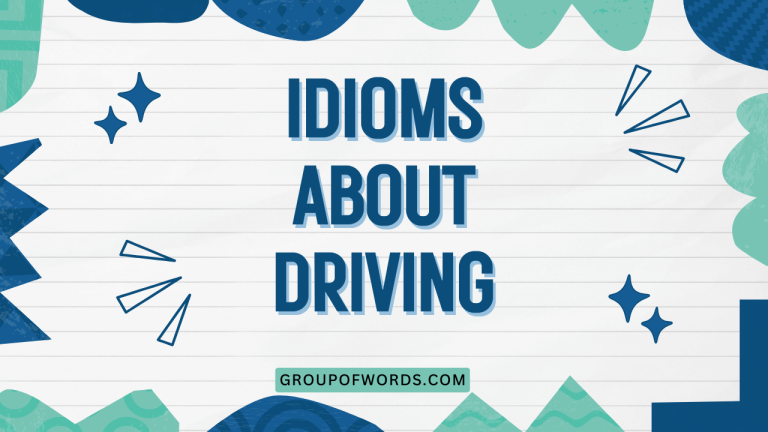Idioms for Heartbreak: Expressing Emotional Pain
Heartbreak is a universal human experience, and English provides a rich tapestry of idioms to express the profound emotional pain it causes. Understanding these idioms allows you to not only better understand the nuances of the English language but also to communicate your feelings, or empathize with others, more effectively.
This article delves into a comprehensive collection of idioms related to heartbreak, exploring their meanings, origins, and usage. This guide is designed for English language learners of all levels, from beginners seeking to expand their vocabulary to advanced speakers aiming to refine their expressive abilities.
By mastering these idioms, you’ll be well-equipped to navigate conversations about love, loss, and the complexities of human relationships.
Table of Contents
- Definition of Idioms for Heartbreak
- Structural Breakdown of Heartbreak Idioms
- Types and Categories of Heartbreak Idioms
- Examples of Heartbreak Idioms
- Usage Rules for Heartbreak Idioms
- Common Mistakes with Heartbreak Idioms
- Practice Exercises
- Advanced Topics in Heartbreak Idioms
- Frequently Asked Questions
- Conclusion
Definition of Idioms for Heartbreak
An idiom is a phrase or expression whose meaning cannot be understood from the ordinary meanings of the individual words. Instead, the phrase has a figurative meaning known only through common usage.
Heartbreak idioms specifically refer to phrases that describe the emotional distress and pain caused by the end of a romantic relationship, unrequited love, or any significant loss. These idioms add color and depth to our language, allowing us to convey complex emotions in a concise and impactful way.
They function as a form of emotional shorthand, instantly communicating the intensity of the pain experienced.
Heartbreak idioms can be classified based on their figurative meaning. Some focus on the act of breaking or shattering (e.g., “break someone’s heart”), while others emphasize the resulting pain and suffering (e.g., “a broken heart”).
Still, others describe the emotional state of the heartbroken individual (e.g., “down in the dumps”). The context in which an idiom is used is crucial to understanding its intended meaning.
For example, “to have the blues” can refer to general sadness, but in the context of a breakup, it indicates a deeper, more profound sense of loss. Mastering these idioms requires understanding both their literal components and their figurative interpretations.
Structural Breakdown of Heartbreak Idioms
Heartbreak idioms often follow specific structural patterns, which can help in understanding and using them correctly. Many idioms are verb phrases, meaning they consist of a verb and one or more other words that function as a unit.
For example, “break someone’s heart” is a verb phrase where “break” is the verb and “someone’s heart” is the object. Other idioms may be noun phrases, such as “a broken heart,” where “broken heart” functions as a single noun.
Understanding these structural elements is crucial for grammatical accuracy.
The structure of a heartbreak idiom can also influence its usage. Verb phrases often require a subject and may take different forms depending on the tense.
For example, “He broke her heart” (past tense) versus “He is breaking her heart” (present continuous tense). Noun phrases, on the other hand, can be used as subjects, objects, or complements in a sentence.
“A broken heart is a heavy burden” (subject) versus “She has a broken heart” (object). Recognizing these structural variations allows for flexible and accurate use of heartbreak idioms in different grammatical contexts.
Types and Categories of Heartbreak Idioms
Heartbreak idioms can be categorized based on the aspect of emotional distress they emphasize. Some describe the act of causing heartbreak, while others focus on the experience of being heartbroken.
Still others describe the emotional and psychological consequences of heartbreak. Understanding these categories can help you choose the most appropriate idiom to express a particular feeling or situation.
Here are some common categories:
Idioms Describing the Act of Causing Heartbreak
These idioms focus on the actions that lead to emotional pain in another person. They often involve verbs that suggest breaking, shattering, or causing distress.
Idioms Describing the Experience of Being Heartbroken
These idioms focus on the feelings and sensations experienced by someone who is suffering from heartbreak. They often involve metaphors related to physical pain, emotional distress, or loss.
Idioms Describing the Emotional State After Heartbreak
These idioms describe the long-term emotional and psychological effects of heartbreak, such as sadness, depression, and difficulty moving on.
Examples of Heartbreak Idioms
The following tables provide extensive examples of heartbreak idioms, categorized by their primary focus. Each example includes the idiom, its meaning, and a sentence demonstrating its usage.
These examples will help you understand the nuances of each idiom and how to use them effectively in conversation and writing.
Table 1: Idioms Describing the Act of Causing Heartbreak
This table focuses on idioms that describe the actions that lead to emotional pain in another person. They often involve verbs that suggest breaking, shattering, or causing distress.
| Idiom | Meaning | Example Sentence |
|---|---|---|
| Break someone’s heart | To cause someone emotional pain, especially by ending a romantic relationship. | He broke her heart when he told her he was leaving for another woman. |
| Tear someone’s heart out | To cause someone extreme emotional pain. | Losing the championship game felt like they tore my heart out. |
| Lead someone on | To mislead someone into believing you have romantic interest in them. | She accused him of leading her on when he said he only wanted to be friends. |
| Play with someone’s heart | To treat someone’s feelings carelessly or insincerely. | He played with her heart, knowing she was deeply in love with him. |
| String someone along | To deceive someone by pretending to be interested in them. | She realized he was just stringing her along and decided to end the relationship. |
| Give someone the brush-off | To reject or dismiss someone in an abrupt or unkind way. | After their date, he gave her the brush-off, never calling again. |
| Leave someone in the lurch | To abandon someone in a difficult situation. | He left her in the lurch right before their wedding. |
| Jilt someone | To reject or abandon a lover. | She jilted him at the altar, leaving him heartbroken. |
| Dangle someone on a string | To keep someone in a state of uncertainty about a relationship. | He kept dangling her on a string, never committing to a serious relationship. |
| Trample on someone’s feelings | To disregard or disrespect someone’s emotions. | He trampled on her feelings by openly flirting with other women. |
| Stab someone in the back | To betray someone’s trust. | She felt stabbed in the back when her best friend started dating her ex. |
| Run roughshod over someone’s heart | To treat someone’s feelings with complete disregard. | He ran roughshod over her heart, showing no remorse for his actions. |
| Shatter someone’s dreams | To destroy someone’s hopes and aspirations. | His rejection shattered her dreams of a future together. |
| Dash someone’s hopes | To disappoint someone by ruining their hopes. | The news of his engagement dashed her hopes of reconciliation. |
| Torment someone’s soul | To cause someone deep emotional suffering. | His betrayal tormented her soul for years after. |
| Tug at someone’s heartstrings | To evoke feelings of pity or sympathy in someone. | The sad story tugged at her heartstrings, making her cry. |
| Wreak havoc on someone’s emotions | To cause significant emotional distress. | The breakup wreaked havoc on her emotions, leaving her a mess. |
| Leave someone high and dry | To abandon someone in a difficult situation with no help. | He left her high and dry when she needed him the most. |
| Make someone’s heart bleed | To cause someone great sorrow or pity. | Seeing him so unhappy made her heart bleed. |
| Put someone through the wringer | To subject someone to a difficult or stressful experience. | The breakup put her through the wringer, but she eventually recovered. |
| Give someone a raw deal | To treat someone unfairly. | She felt he gave her a raw deal by ending the relationship so abruptly. |
| Rain on someone’s parade | To spoil someone’s enjoyment or plans. | He rained on her parade by telling her he couldn’t commit. |
| Pull the rug out from under someone | To suddenly remove support or security from someone. | He pulled the rug out from under her when he filed for divorce. |
| Drive a wedge between people | To cause conflict and separation between people. | His lies drove a wedge between them, ultimately ending their relationship. |
Table 2: Idioms Describing the Experience of Being Heartbroken
This table focuses on idioms that describe the feelings and sensations experienced by someone who is suffering from heartbreak. They often involve metaphors related to physical pain, emotional distress, or loss.
| Idiom | Meaning | Example Sentence |
|---|---|---|
| Have a broken heart | To feel extreme sadness and grief, typically due to the ending of a romantic relationship. | After the breakup, she had a broken heart and couldn’t stop crying. |
| Be heartbroken | To be extremely sad and disappointed. | He was heartbroken when she told him she didn’t love him anymore. |
| Feel blue | To feel sad or depressed. | She felt blue for weeks after the relationship ended. |
| Be down in the dumps | To feel sad and without energy. | He was down in the dumps after getting rejected. |
| Have a heavy heart | To feel sad or sorrowful. | She had a heavy heart as she packed his belongings. |
| Be in pieces | To be emotionally shattered or devastated. | After the betrayal, she was in pieces and couldn’t function properly. |
| Feel like your heart has been ripped out | To feel an intense sense of loss and pain. | Losing him felt like her heart had been ripped out. |
| Feel like you’ve been stabbed in the heart | To feel a sudden and sharp emotional pain. | Hearing the news felt like she’d been stabbed in the heart. |
| Be cut up about something | To be very upset about something. | He was really cut up about the breakup. |
| Be torn up inside | To be experiencing intense emotional turmoil. | She was torn up inside, unable to decide whether to stay or leave. |
| Feel the sting of rejection | To experience the painful feeling of being rejected. | He felt the sting of rejection when she turned him down. |
| Go through the mill | To experience a very difficult or unpleasant time. | She went through the mill after the divorce. |
| Be left with a gaping hole in your heart | To feel an emptiness and longing after a loss. | His death left a gaping hole in her heart that could never be filled. |
| Be left with a void | To feel an emptiness or lack after a loss. | The breakup left her with a void that she struggled to fill. |
| Be in a dark place | To be in a state of depression or emotional distress. | After the loss, he was in a dark place and needed help. |
| Feel like the world is ending | To feel like the situation is catastrophic and unrecoverable. | To her, the breakup felt like the world was ending. |
| Feel like you’ve lost everything | To feel like you’ve lost something irreplaceable and valuable. | She felt like she’d lost everything when he left. |
| Feel like you’re drowning in sorrow | To feel overwhelmed by sadness and grief. | She felt like she was drowning in sorrow after the tragedy. |
| Have a lump in your throat | To feel emotional and on the verge of crying. | She had a lump in her throat as she said goodbye. |
| Be choked up | To be unable to speak due to strong emotion. | He was too choked up to give his speech. |
| Be on the verge of tears | To be close to crying. | She was on the verge of tears as she recounted the story. |
| Cry your heart out | To cry intensely and for a long time. | She cried her heart out after the breakup. |
| Shed tears | To cry. | He shed tears as he watched her leave. |
| Be inconsolable | To be impossible to comfort. | She was inconsolable after the loss of her pet. |
Table 3: Idioms Describing the Emotional State After Heartbreak
This table focuses on idioms that describe the long-term emotional and psychological effects of heartbreak, such as sadness, depression, and difficulty moving on.
| Idiom | Meaning | Example Sentence |
|---|---|---|
| Carry a torch for someone | To continue to be in love with someone, even after the relationship has ended. | He still carries a torch for his ex-girlfriend. |
| Dwell on the past | To think or talk at length about past events, especially those that are unpleasant. | She needs to stop dwelling on the past and move forward. |
| Live in the past | To spend too much time thinking about past events rather than focusing on the present or future. | He lives in the past, always talking about his glory days. |
| Be hung up on someone | To be unable to stop thinking about someone, especially after a relationship has ended. | She’s still hung up on her ex-boyfriend. |
| Not be able to get over someone | To be unable to move on from a past relationship. | He can’t get over his first love. |
| Nurse a broken heart | To try to heal from emotional pain, especially after a breakup. | She’s nursing a broken heart by spending time with friends. |
| Lick your wounds | To take time to recover from a defeat or disappointment. | He’s licking his wounds after the company’s failure. |
| Wallower in self-pity | To indulge in feelings of sadness and hopelessness. | She needs to stop wallowing in self-pity and take action. |
| Have a long face | To look sad or unhappy. | He’s been having a long face ever since the breakup. |
| Be a shadow of your former self | To be much less happy, healthy, or capable than you were in the past. | After the illness, he was a shadow of his former self. |
| Go to pieces | To become emotionally or mentally unstable. | She went to pieces after her husband’s death. |
| Be a basket case | To be emotionally unstable or overwhelmed. | He was a complete basket case after the accident. |
| Be on the mend | To be recovering from a difficult experience. | She’s on the mend after the surgery. |
| Turn over a new leaf | To start behaving in a better way. | He decided to turn over a new leaf and quit drinking. |
| Move on | To start to have a normal life again after a difficult experience. | It’s time to move on and forget about the past. |
| Put something behind you | To forget about something unpleasant and move forward. | She tried to put the incident behind her. |
| Pick up the pieces | To try to return to a normal situation after a disaster or difficult period. | After the storm, they had to pick up the pieces and rebuild. |
| Get back on your feet | To recover from a difficult situation. | It took him a while to get back on his feet after losing his job. |
| See the light at the end of the tunnel | To see signs that a difficult situation is coming to an end. | After months of hard work, they could finally see the light at the end of the tunnel. |
| Come to terms with something | To gradually accept a sad situation. | She’s still coming to terms with her father’s death. |
| Heal over time | To gradually recover from emotional pain. | The pain will heal over time. |
| Time heals all wounds | A saying that suggests emotional pain will lessen with time. | “I know it hurts now, but time heals all wounds,” she said. |
| Learn to live with it | To accept and adapt to a difficult situation. | She had to learn to live with the loss. |
| Get over it | To recover from a disappointment or problem. | He needs to get over it and move on. |
| Find closure | To reach a point of emotional resolution after a difficult experience. | She needed to find closure after the breakup. |
Usage Rules for Heartbreak Idioms
Using heartbreak idioms correctly requires attention to grammatical structure, context, and cultural sensitivity. Here are some key usage rules to keep in mind:
- Grammatical Agreement: Ensure that the idiom agrees with the subject in terms of tense and number. For example, “She has a broken heart” (present tense) versus “She had a broken heart” (past tense).
- Contextual Appropriateness: Choose idioms that are appropriate for the situation and audience. Some idioms may be too informal or intense for certain contexts.
- Cultural Sensitivity: Be mindful of cultural differences in how heartbreak is expressed and perceived. Some idioms may not translate well or may be offensive in certain cultures.
- Avoid Overuse: While idioms can add color to your language, overuse can make your writing or speech sound unnatural. Use them sparingly and strategically.
It’s also important to understand the subtle differences between similar idioms. For example, “break someone’s heart” implies a more direct and intentional act of causing pain, while “have a broken heart” simply describes the state of being heartbroken.
Choosing the right idiom can make a significant difference in the message you convey.
Common Mistakes with Heartbreak Idioms
English language learners often make common mistakes when using heartbreak idioms. These mistakes can stem from misunderstanding the meaning of the idiom, misusing its grammatical structure, or applying it in an inappropriate context.
Here are some common errors and how to avoid them:
- Literal Interpretation: Avoid interpreting idioms literally. For example, “break someone’s heart” does not mean physically breaking someone’s heart.
- Incorrect Word Choice: Use the correct words in the idiom. For example, it’s “break someone’s heart,” not “tear someone’s heart.”
- Tense Errors: Ensure the idiom is in the correct tense. “He broke her heart” (past tense) is different from “He is breaking her heart” (present continuous).
- Misunderstanding Connotations: Be aware of the emotional connotations of different idioms. “Feel blue” is milder than “be in pieces.”
Here’s a table illustrating some common mistakes and their corrections:
| Incorrect | Correct | Explanation |
|---|---|---|
| He teared her heart. | He broke her heart. | “Break someone’s heart” is the correct idiom, not “tear.” |
| She is with a broken heart. | She has a broken heart. | The correct phrase is “have a broken heart.” |
| I am feeling the blue. | I am feeling blue. | The correct idiom is “feel blue.” |
| He is very cut about. | He is very cut up. | The correct idiom is “cut up about something.” |
| She is hung on him. | She is hung up on him. | The correct idiom is “hung up on someone.” |
Practice Exercises
These practice exercises will help you reinforce your understanding of heartbreak idioms. Each exercise focuses on a different aspect of idiom usage, from identifying the meaning of an idiom to using it correctly in a sentence.
Answers are provided at the end of each exercise.
Exercise 1: Matching Idioms to Their Meanings
Match the following idioms to their correct meanings.
| Idiom | Meaning |
|---|---|
| 1. Break someone’s heart | A. To feel sad or depressed |
| 2. Feel blue | B. To cause someone emotional pain |
| 3. Carry a torch for someone | C. To be unable to move on from a past relationship |
| 4. Be hung up on someone | D. To continue to be in love with someone |
| 5. Be in pieces | E. To be emotionally shattered or devastated |
Answers:
- 1-B
- 2-A
- 3-D
- 4-C
- 5-E
Exercise 2: Fill in the Blanks
Complete the following sentences with the correct heartbreak idiom from the list below.
Idiom List:
- Left her in the lurch
- Trampled on her feelings
- Cried her heart out
- Nursing a broken heart
- Move on
| Question | Answer |
|---|---|
| 1. He ________ when he abandoned her before their wedding. | Left her in the lurch |
| 2. He ________ by openly flirting with other girls. | Trampled on her feelings |
| 3. She ________ after the breakup. | Cried her heart out |
| 4. She is ________ by spending time with her friends. | Nursing a broken heart |
| 5. It’s time to ________ and forget about the past. | Move on |
Exercise 3: Sentence Completion
Complete the sentence using the correct form of the idiom in parentheses.
| Question | Answer |
|---|---|
| 1. She was completely ________ (tear/torn) inside after the betrayal. | torn |
| 2. The news ________ (feel/felt) like she had been stabbed in the heart. | felt |
| 3. He is still ________ (carry/carrying) a torch for his ex-girlfriend. | carrying |
| 4. She is ________ (go/going) through the mill after the divorce. | going |
| 5. He needs to ________ (get/getting) over it and move on. | get |
Exercise 4: Multiple Choice Questions
Choose the correct idiom to complete the sentence.
| Question | Answers | Correct Answer |
|---|---|---|
| 1. He ________ when he told her he was leaving. | A) broke her leg B) broke her heart C) broke her arm | B) broke her heart |
| 2. She ________ after the breakup. | A) felt red B) felt green C) felt blue | C) felt blue |
| 3. He is still ________ on his ex-girlfriend. | A) hung up B) hang up C) hung on | A) hung up |
| 4. She had a ________ as she packed his things. | A) heavy hand B) heavy heart C) heavy head | B) heavy heart |
| 5. After the betrayal, she was completely ________. | A) in peace B) in one piece C) in pieces | C) in pieces |
Advanced Topics in Heartbreak Idioms
For advanced learners, exploring the origins and evolution of heartbreak idioms can provide a deeper understanding of their cultural significance. Many idioms have historical roots, reflecting societal attitudes towards love, loss, and relationships.
For example, the idiom “carry a torch for someone” is believed to originate from the ancient Greek tradition of torch races, where runners would pass a lit torch to one another. The act of carrying the torch symbolizes enduring passion and devotion, even in the face of adversity.
Another advanced topic is the use of heartbreak idioms in literature and popular culture. Authors and songwriters often use these idioms to evoke strong emotions and create relatable characters.
Analyzing how these idioms are used in different contexts can enhance your understanding of their nuances and expressive power. For instance, a poem might use “a broken heart” to convey a sense of vulnerability and despair, while a pop song might use “get over it” to express resilience and determination.
Frequently Asked Questions
Here are some frequently asked questions about heartbreak idioms, along with detailed answers to help clarify any confusion.
- What is the difference between an idiom and a metaphor?
An idiom is a phrase whose meaning is different from the literal meanings of the individual words, and its meaning is understood through common usage. A metaphor is a figure of speech that directly compares two unrelated things, highlighting a similarity between them. While idioms often contain metaphors, not all metaphors are idioms. “Break someone’s heart” is an idiom that uses the metaphor of breaking to describe emotional pain. A simple metaphor might be “Her eyes were stars,” directly comparing her eyes to stars.
- How can I learn new heartbreak idioms effectively?
The best way to learn new idioms is through exposure and practice. Read books, watch movies, and listen to music in English. Pay attention to how native speakers use idioms in conversation. Keep a notebook of new idioms you encounter, along with their meanings and example sentences. Practice using these idioms in your own writing and speech. Flashcards and language learning apps can also be helpful tools for memorization.
- Are heartbreak idioms universal across all English-speaking countries?
While many heartbreak idioms are widely understood across English-speaking countries, some may be more common in certain regions or cultures. For example, an idiom that is popular in the United States may not be as well-known in the United Kingdom or Australia. Be aware of regional variations and cultural nuances when using idioms. If you are unsure whether an idiom is appropriate for a particular audience, it’s best to err on the side of caution and choose a more universally understood expression.
- Can I create my own heartbreak idioms?
While it’s possible to create new phrases, they wouldn’t technically be idioms until they gain widespread use and acceptance. Idioms become idioms through repeated use and cultural understanding. If you create a phrase that resonates with people and catches on, it could potentially become a new idiom over time. However, for effective communication, it’s generally best to stick to established idioms that are already understood by native speakers.
- How do I know when it’s appropriate to use a heartbreak idiom?
The appropriateness of using a heartbreak idiom depends on the context, audience, and your relationship with the person you are speaking to. In general, idioms are more suitable for informal conversations and writing than for formal settings. Consider your audience’s level of English proficiency and cultural background. If you are unsure whether an idiom is appropriate, it’s best to use a more direct and literal expression.
- What are some alternatives to using heartbreak idioms?
If you want to avoid using idioms, you can express your feelings using more direct and literal language. For example, instead of saying “She broke my heart,” you could say “I am very sad because she ended our relationship.” Instead of saying “I have a broken heart,” you could say “I am feeling very heartbroken.” While these alternatives may not have the same emotional impact as idioms, they are clear and easy to understand.
- How do I avoid sounding cliché when using heartbreak idioms?
To avoid sounding cliché, use heartbreak idioms sparingly and strategically. Choose idioms that are particularly relevant to the situation and that accurately express your feelings. Avoid overusing common idioms like “a broken heart” or “feel blue.” Instead, try to incorporate less common idioms that add more color and originality to your language. Also, be mindful of the context and audience. Using an idiom in a fresh and unexpected way can make it sound more original and less cliché.
- How can understanding heartbreak idioms help me in my daily life?
Understanding heartbreak idioms can enhance your ability to communicate effectively and empathize with others. When you understand the nuances of these idioms, you can better express your own feelings of sadness, loss, and disappointment. You can also better understand and support friends and family members who are going through a difficult time. Furthermore, understanding idioms can improve your overall comprehension of English literature, movies, and music, enriching your cultural experience.
Conclusion
Mastering idioms for heartbreak is a valuable asset for any English language learner. These expressions provide a powerful way to articulate complex emotions and connect with others on a deeper level.
By understanding the definitions, structures, and usage rules of these idioms, you can express yourself more effectively and navigate conversations about love, loss, and relationships with greater confidence. Remember to practice regularly, pay attention to context, and be mindful of cultural nuances.
With consistent effort, you can expand your vocabulary and enhance your ability to communicate in English.
As you continue your language learning journey, remember that idioms are just one piece of the puzzle. Continue to explore other aspects of English grammar and vocabulary to further improve your fluency and accuracy.
Embrace the challenges and celebrate your progress along the way. With dedication and perseverance, you can achieve your language learning goals and unlock new opportunities for communication and connection.






